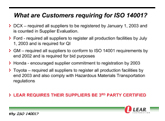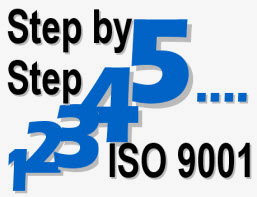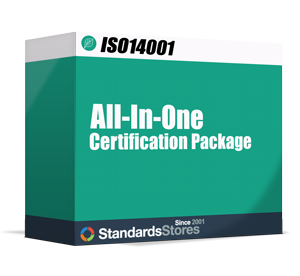Forced Into ISO 14001 Certification?
It Is Not Difficult And It Really Will Help Your Organization
While no company likes mandates that they feel can add to their production or service delivery costs, complying with a requirement to comply ISO 14001 is not an automatic burden these days. New efficient implementation options, better explanations and the support (and clarity being given by ISO itself), gaining and maintaining certification is becoming a very manageable process. Whether this easier path to ISO 14001 registration is encouraging customers to require certification from their suppliers is not clear, but there certainly are many that are asking.

All Quality certificates, transition plans and Environmental Certificates (ISO 14001 or Responsible Care Management Systems, (RCMS) Technical Spec. RC 101.02) must be submitted via [Email or FAX]. Failure to submit a valid timeline and transition plan or a copy of your renewal certificate will have negative impact on your supplier monthly Scorecard and potentially harm your relationship with Lear…
Is ISO 14001 Certification Worth It? – How Can You Achieve It?

In addition to concluding that those who adopt the practices do indeed improve their environmental performance, it builds upon previous initial studies that cite participating companies who accomplished improvements in these areas:
- Reduced energy use
- Generation of less waste
- Fewer overall accidents and chemical spills
- And improved compliance with existing regulations
Since ISO 14001 is essentially a self-selecting pool of companies, the study supports the concept that this form of standardized, self-regulation has helped lessen imposition of varying types and levels of other regulations which would in effect be harder (and more expensive) with which to comply. This concept of preventative action to contain future costs is one of the issues that companies often see as an advantage.
How You Should Comply With An ISO 14001 Certification Request
While there are costs associated with ISO 14001 certification, many companies may not realize how much savings can occur by:
- Doing part or all of the work themselves, versus hiring outside consultants
- Seeking reimbursement from various government resources
- Shopping diligently and negotiating better pricing from those outsourced processes (training, auditing, registrars, etc.) functions that are required

- Create everything (documentation, training materials, etc.) on your own by reading and interpreting the standard.(Of course you know your business better than anyone, and you are in the best position to document your processes. But do you have the time to create hundreds of pages of documentation plus training?)
- Use documentation templates and training programs (like ours) to train your organization. You still do it yourself, but not alone. (For a very small investment, you can train your people and create a solid EMS very efficiently, saving you weeks and weeks of time and frustration.)
- Hire an ISO consultant to complete the entire process with you. If you are short on people and have the funds, this may be the most effective option. However, this is the most expensive option ($5,000 -$50,000) as they would typically create (and charge you for) many of the documents included in a package. You will end up paying for the transfer of knowledge to the consultant so he/she may put together the Environmental Management System (EMS).
Quick Lessons That Will Make Your Registration Process Easier
As that Harvard Business study suggests, ISO 14000 certification usually pays off and is well worth your time. But do not do it without sincere commitments from management to support it. It will not work and you will be wasting time. Here are some pretty essential actions to take when implementing ISO 14001:
- Get the right team together and motivate them. Making environmental protection a priority and turning your environmental management team into heroes, not impediments, makes the process easier for you and everyone else.
- You do not own the environmental management process, it is for everyone. In fact, there is no way any type of environmental effort will succeed if anyone feels the job belongs to someone else. Force does not work that well either, but a thorough education and understanding does, and that is your job: To educate, inspire and aid others in producing environmentally – compatible products and services.
- Train, train, train. Letting people know what is in it for them helps. If there are additional certifications that people can gain to help them be more valuable in their career, then promote that. Do not be afraid to ask for specific skill improvements. And do not forget thestandards themselves. Make sure you not only have one, but provide the text and explanations to everyone in language that can be understood and acted upon.
- Do not use the excuse that certification requires extra effort. Many times people may say that standards require specific extra effort that is not justified. Before you accept this, ask them where in the standard this requirement is. Often it is a matter of interpretation as to the level or type of action needed to comply. And there are always less expensive choices.
In the end, ISO 14000 should be a plus. Being truthful about the process and the attitudes taken along the way can keep it from becoming a burden and make it the asset that so many other companies have found it to be.
Bottom-Line Justification For Getting ISO 14000 Certified
Of course, putting other reasons to gain certification into the return on investment evaluation may make more sense, and provide a higher level of buy in and execution from the organization. (It will also prevent problems downstream when the inevitable customer audit comes around). In that case it may be possible to Here are just some of the reasons you may wish to move higher in business evolution and gain certification other than just to retain/acquire business:
- ISO 14001 certification is a risk management tool for the overall business.Those businesses that engage in a robust environmental management system, particularly one that encompasses all operations as ISO does (particularly if you add in the ISO 9004 Series, which adds in all those who might affect the business including investors, customers, suppliers, etc.), tend to do better in responding to changing conditions. Also, they work within a more defined scope and tend to avoid situations that may degrade their overall profitability.
- ISO 14001 certification is an engine of growth. Because if opens the doors to a wider spectrum of business relationships (up and down the production and distribution chain), it can open new opportunities in areas that may not be possible otherwise. In effect, this is the flip side of being forced, since knowledge of a company having an ISO 14001 certification can be a marketing aide, as customers search for ISO 14000-qualified firms with which to do business. (Yes, it happens, they call you!)
- ISO 14001 certification helps keep business longer. Companies that require ISO 14001 certification as a mandate for doing business, also are typically willing to invest more and do more to maintain the relationship. It is a cost of doing business for them as well since they must audit the process, so they do not want to have to change unless conditions require it. In the end, ISO 14001 certification increases customer loyalty and lowers production costs. Unplanned or unwanted product deviations cost everyone time and money.
The bottom line, from a customer standpoint, is that the higher the level of support for the environment, the more that company will be respected and trusted, which ultimately influences buying decisions.


